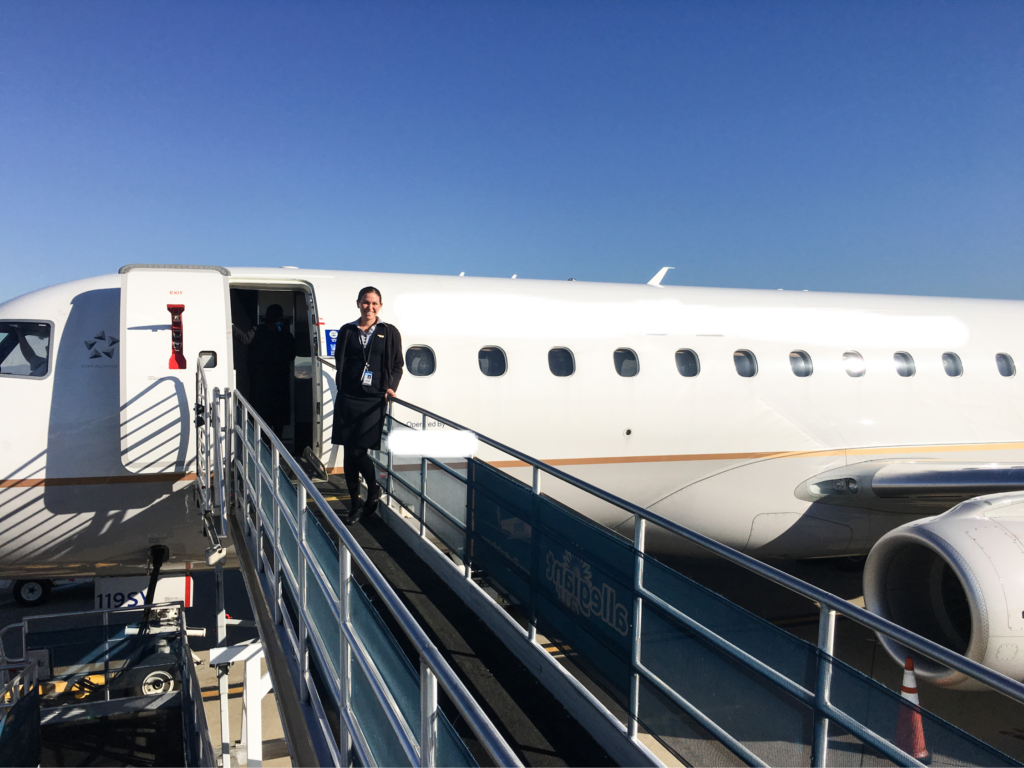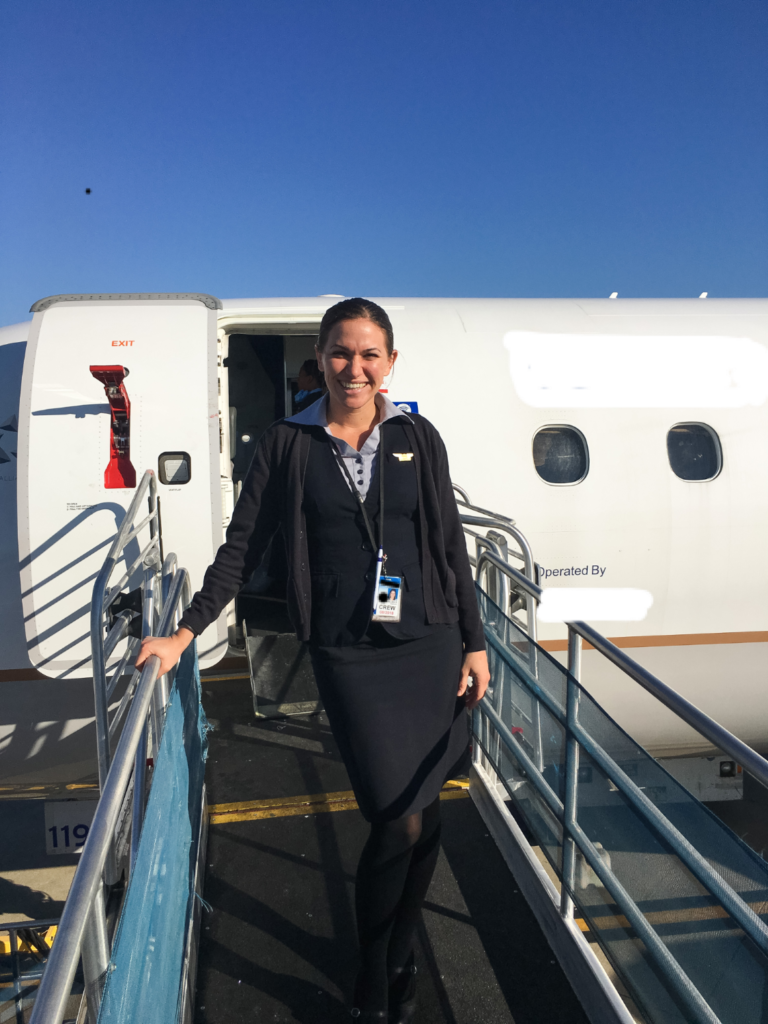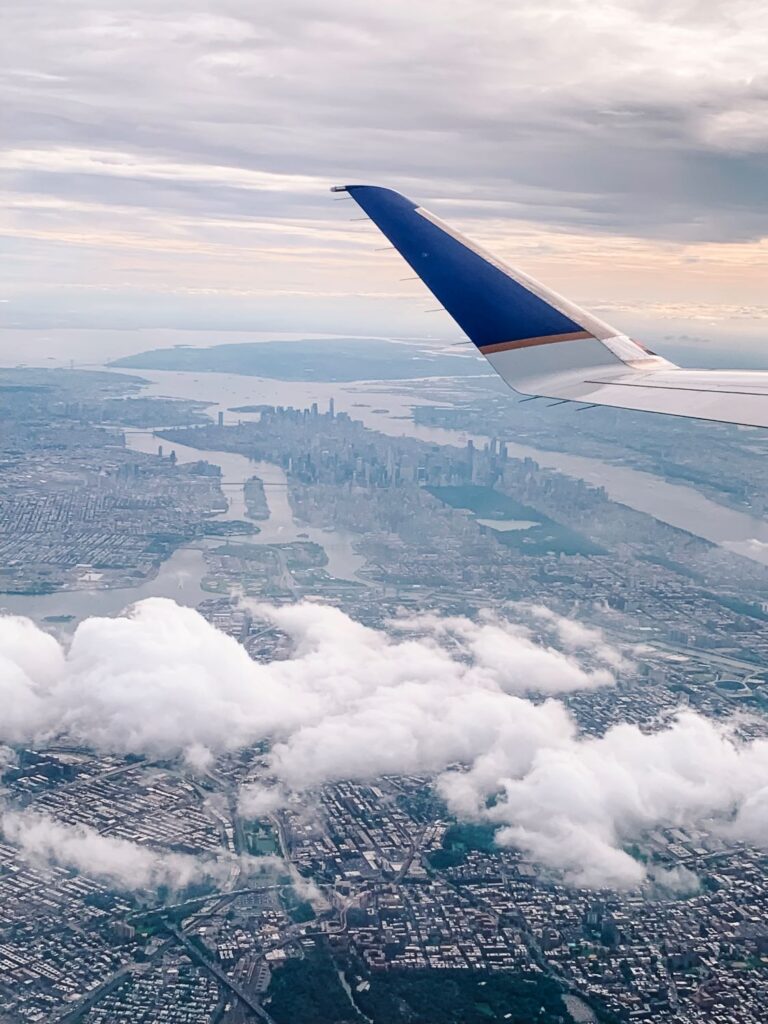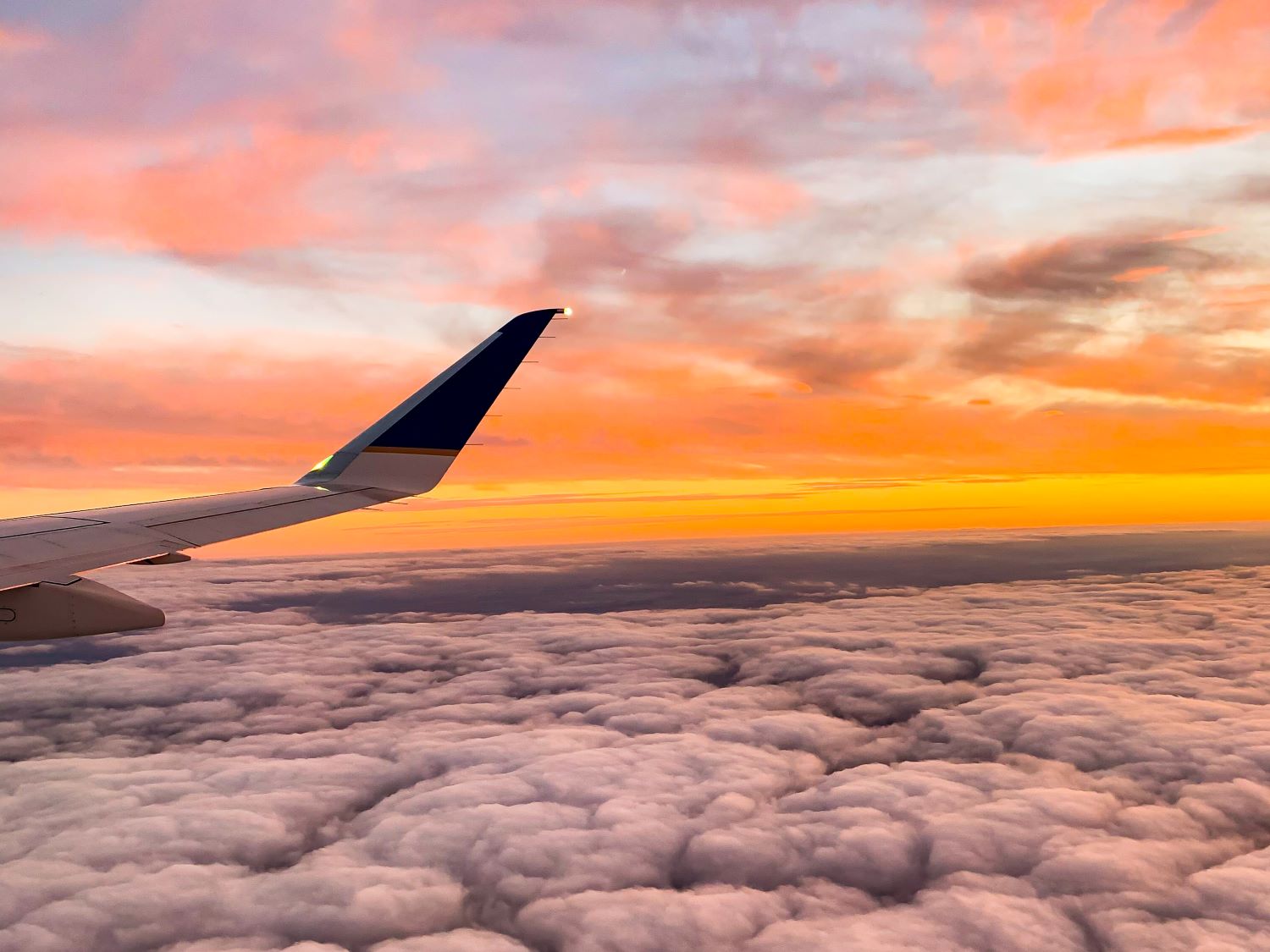Regional vs Mainline Flight Attendant: The Pros and Cons of Both
I’ve been asked a handful of times over the years for information and tips on becoming a flight attendant. I’ve responded to messages and had various conversations here and there but my answers have never all been put into one place before. So this is me writing out my thoughts for anyone who may wonder now or in the future about becoming a flight attendant. Let’s see if I can answer my most frequently asked questions and also cover the pros and cons between regional vs mainline flight attendant positions.

Regional vs Mainline Flight Attendant
The first thing to know when it comes to becoming a flight attendant is the difference between a mainline and a regional airline. A mainline is one of the big hitter airlines we’re mostly all familiar with. American, Delta, United, Southwest etc. These airlines typically fly routes between their hubs, highly populated cities, and international destinations.
A regional airline is an airline contracted by a mainline to fly small regional planes under their name. These include SkyWest, Republic, Envoy, Horizon, etc. Regional airlines typically stay within the continental US (+ a few cities in Canada and Mexico). They also tend to fly to smaller sometimes less populated cities to connect them with mainlines’ hubs. (Hubs meaning airports that serve as transfer (connection) points to other destinations). What many people don’t realize is that there’s a good chance they’ve probably flown on a regional airline before. Your ticket would say something like, “United Airlines operated by SkyWest Airlines.” The plane would also likely have two seats on each side of the aisle as opposed to three. (Ring a bell at all?)
Now, when asked if it’s better to work as a flight attendant at a mainline or regional airline my response is always, “Yes.” And by that I mean there’s pros and cons to both. My recommendation would therefore be to weigh out the pros and cons of each to determine which type of airline would be the best fit for *you.* Here’s what you should consider:
Mainline Pros:
* You work on bigger planes.
There’s something a little extra exciting about a bigger plane; am I right? You board a giant jumbo jet to some international destination and before you’ve even gotten there you’re already shocked and impressed simply by the behemoth of a plane you’re flying on! At a mainline airline you have the opportunity to WORK on those planes. How cool is that?! Bigger planes also mean more crew members to work with and potentially spend time hanging out with on your overnight. Gotta love the friend factor. 😉
* You get to do international flying.
What a cool way to see the world! You get paid to work a flight, enjoy a chunk of time in an international destination, and then work a flight back home. I can’t think of any other jobs that basically pay you to travel…
* You may end up with cool(er) overnights.
Even if it’s not international flying there’s a good chance you’ll frequently end up in some pretty cool domestic destinations. As I said, mainlines typically fly between hubs and highly populated cities. These often include popular cities to visit and vacation in.
* You get paid more.
One of the biggest perks of working at a mainline is hands down the fact that you’re paid significantly more. (I’ll leave it to Google to provide anymore information on that).
* You get higher priority on your airline’s flights.
One of the biggest perks of working for ANY airline is the flight benefits that come with it. It’s all standby flying which means you only get on the flight if there are unsold seats available. Nonrevs (meaning non revenue, or standbys) are boarded in a specific priority. Employees of the airline are at the top of the list in order of their hire date. All others are listed in order of their hire date with the airline they work for. So, for example, if you worked at XXX airline you’d have higher boarding priority on a XXX airline flight than an employee at any other airline even if they had worked at their airline for longer than you had worked at XXX. (This perk is *especially* handy when flying standby internationally since regional airlines don’t typically fly to those destinations, remember?)
Mainline Cons:
* Seniority doesn’t move as quickly.
Seniority is EVERYTHING at ANY airline. Seniority is how boarding priority is determined when flying standby, and the order in which work schedules are determined each month. (Meaning the person who’s been at the airline for the longest gets first pick on which trips/days off they’d like and it goes down the seniority list from there. The longer you’ve been at the airline the more likely you are to get the trips and days off you’d like).
The thing about mainline flight attendants is that they seem to stick around FOREVER. 😄 I’ve even heard a joke that the Eskimo logo on the tail of Alaska’s planes is actually a United flight attendant! 😉 Being lower in seniority means there’s a good chance you’ll work numerous holidays and weekends. And there’s no telling when that would change. It would be whenever enough people above you in seniority retired or resigned and enough people were hired after you to boost your seniority up from the bottom of the barrel.
It’s slow moving at a mainline. And by “slow” I mean I was once talking to a coworker who’s mainline flight attendant mom was thrilled to have FINALLY gotten her transfer to a certain base after waiting 17 years for it. SEVENTEEN. 🤯 If you’re waiting THAT many years for your seniority to move up enough to be able to have weekends and holidays off, for example, you have to consider the fact that that’s A LOT of kids’ weekend sports tournaments and Christmases you could potentially be missing out on.
* There’s a higher possibility of furlough.
To the *best* of my knowledge there’s been at least three times in recent (ish) years that mainline airlines have had to significantly downsize their staffing and furlough employees: After 9/11, some time around 2008 when the economy was struggling, and most recently during Covid. I can’t say I KNOW this is a fact, but word on the street (in the air? 😆) was that in the midst of downsizing due to Covid, a certain mainline gave furlough warning notices to flight attendants with hire dates all the way back to 1996! 1996!!!!! That’s INSANE. 😳
* You only get flight bennies on the airline you work for.
*Generally* speaking the airline you work for is the airline you get flight benefits on. Which means if you work at a mainline you’re limited to that one airline’s flights. Yes there are *some* agreements between airlines that allow their employees and their family/friends to fly on each other’s flights. (Sometimes for a reduced fee). But for the sake of keeping things simple here, you *mostly* only have flight benefits on the mainline airline you work for.
* Getting hired is extremely competitive.
I once read that based on the number of applications received vs. the number of applicants accepted, it’s more competitive to be hired as a flight attendant at Delta than it is to get into Harvard. 😳
Regional Pros:
* You have flight benefits on multiple airlines.
If you’re working at a regional airline that partners with multiple mainline airlines, to the best of my knowledge, you get flight benefits on all of those airlines. Which means your family and friends have access to your flight benefits on all of those airlines as well.
* Seniority moves more quickly.
For whatever reasons the turnover rate at regional airlines is much higher than mainline airlines. Which means your seniority moves MUCH more quickly at a regional. Which also means it doesn’t take INCREDIBLY long to get weekends and holidays off from work or transfer bases if you choose. (Ball park estimates: 1-3 years for weekends and holidays off and *maybe* a few months [or less] for a base transfer.)
* You’re less likely to be furloughed.
Because seniority moves more quickly at regional airlines it means you’re quicker to climb the seniority ladder and less likely to stay at the bottom of the barrel for too long. Which means you’d have a higher chance of avoiding furlough if the possibility of that was on the horizon.
* You see places in the US you may not have otherwise.
Since regional airlines frequently fly into smaller cities to connect them to mainlines’ hubs, it’s not uncommon to overnight in these cities. Cities you’ve heard of but maybe wouldn’t have thought to visit, hidden treasures in surprising places, and small town USA are just a few of the qualities regional overnights offer. The US truly has some cool little gems. 😊
* Getting hired isn’t as competitive.
That’s not to say it’s all easy peasy to be hired at a regional. You still need to have a proper resume, act professionally, interview well, etc. But the competition isn’t quite as fierce as it is at mainlines.
Regional Cons:
* You’re not paid as much.
This is probably the biggest con of working for a regional airline. But I’ll leave it to Google to provide anymore information on that.
* You may end up with overnights in less “cool” places.
As much as the US has some cool places to see, it also has some less cool places as well. (I’m talking cities that have one stop light, the only hotel (and “civilization”) in the area is 45 minutes away from the airport, when you Google “best restaurants in [city],” Taco Bell makes the top 3, etc. At a regional airline there’s a good chance you’ll pass through and overnight in some of those cities.
* You work on smaller planes.
Regional planes require only 1 or 2 flight attendants depending on the aircraft type. It’s not quite as awe inspiring as a jumbo jet heading to an international destination. It can also get a little lonely if you’re working by yourself.
And that’s the bulk of what you should know about becoming a regional vs mainline flight attendant. Again, you truly have to weigh the pros and cons and choose the best option for *you.*
I’ll say that for myself I work at a regional airline and it’s the best fit for *me.* Yes the pay isn’t as much as I’d be making at a mainline but my personal financial needs are perfectly met. I’m able to cover my living expenses, fund my travels, AND put a little into savings every month.
I’ve worked at the regional I’m at for quite a number of years now. I have a good amount of seniority under my belt and I have decent say in my schedule every month. I enjoy (and also make frequent use of!) the flight benefits that come with the airline I work for. So overall it’s the quality of life that’s kept me at the regional airline I work for. (Which of course wouldn’t be impossible to obtain at a mainline it would (likely) just take a loooooooooot longer to get there.)
I hope this helps shed some light on the topic if you’ve ever thought about becoming a regional vs mainline flight attendant. But if you have any specific questions I’m always happy to answer them. 🙂
Safe travels friends.
CE






